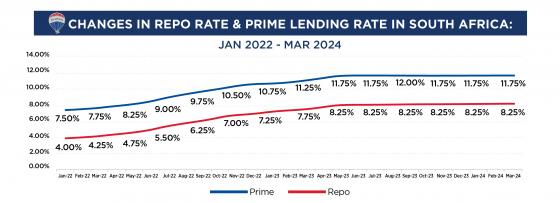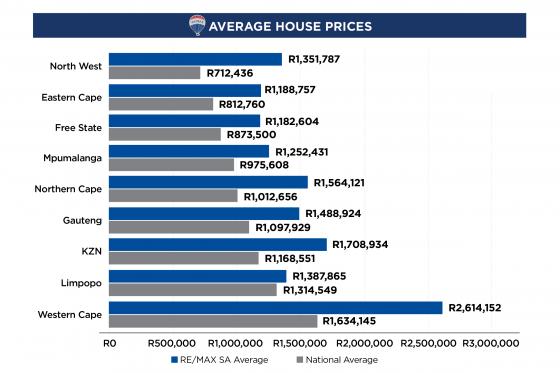Despite a multitude of factors working against it, the South African property market remains surprisingly active in the first quarter of this year; but house price growth remains hampered by broader economic conditions.
Adrian Goslett, Regional Director and CEO of RE/MAX of Southern Africa expected there to be slow growth in face of the external factors, including record-high interest rates, rising inflation, and slow economic growth.
“With all that in mind, our network doesn’t seem to be allowing these external factors to stand in between them and closing a sale. At the end of Q1 2024, our reported sales (live deals) are up 22% on Q1 2023. What’s more, the average days until a listing was marked as sold on remax.co.za was 21.5 days,” he notes.
However, when looking at registered sales from the Deeds Office, the national average sale’s price in Q1 2024 amounted to R1,158,987*. Compared to the national average price of R1,170,135* in Q1 2023, this is a decrease of 0.95%. Where the market overall is down roughly 10% in registered sales value, the RE/MAX SA network is up by roughly 6% in registered sales value.
Expanding on this, Goslett clarifies that registered sales totals essentially reflect sales that were concluded roughly two to three months prior to the date of registration. “With this in mind, the full impact of the interest rate hikes were unlikely to reflect in the Q1 2023 registered sales totals. Although there were many steep interest rate hikes throughout 2022, there is a lag effect on how these increases affect the market – consumers only really start to feel the pinch a few months after the increase has taken effect. That is why it can be expected that Q1 2024, which will reflect the full impact of these hikes, would perform poorer than Q1 2023,” he explains.

PROVINCIAL & SUBURB TRENDS

The average registered sales price of the RE/MAX SA network is higher than the national average in every province. “Interestingly, though, when looking at the listing prices on remax.co.za, the average active listing price made a notable drop from R4,768,265 in Q1 2023 to R2,754,249 in Q1 2024. Considering that this is live data, this is likely to have a greater impact on the registered sales totals in the next quarter,” Goslett remarks.
As the province with the largest population, it comes as no surprise that Gauteng had the highest number of units sold in Q1 2024, followed by the Western Cape and then KZN. While Gauteng dominated in the top 5 spots according to total units sold per suburb, the Western Cape dominated in terms of total sales value per suburb. When looking at search volumes on remax.co.za, the Western Cape also claimed all 5 spots for the top searched suburbs. The Western Cape also continues to be the highest priced province at a provincial average of R1,634,145*.
Top 5 suburbs based on total units sold*:
- Fleurhof, Gauteng
- Nigel Rural, Gauteng
- Cosmo City, Gauteng
- Sitari Country Estate, Somerset West, Western Cape
- Randpark Ridge, Gauteng
*Based on national deed’s office information
Top 5 suburbs based on total sales value*:
- Sunningdale, Western Cape
- Constantia, Western Cape
- Sea Point, Western Cape
- Bryanston, Gauteng
- Clifton, Western Cape
*Based on national deed’s office information
Top 5 most searched suburbs on remax.co.za:
- Parklands, Western Cape
- Claremont, Western Cape
- Sunningdale, Western Cape
- Rondebosch, Western Cape
- Bloubergstand, Western Cape
Final thoughts
“The results of this first quarter are interesting. My interpretation of this data is that there is still a strong need to buy and sell property across South Africa; however, owing to the restrictive broader economic conditions, buyers are unable (and most likely also unwilling) to pay an inflated price for a property. When this happens, house price growth remains slow because sellers have to realign their asking price to what buyers are willing and able to offer within the current market.”
“While the demand for real estate remains strong, average house price growth continues to be hamstrung by poor economic growth and unfavourable interest rates. Although each suburb and each province have been affected differently by this, from a national perspective, house prices are unlikely to deliver stronger growth rates until the broader economic conditions become more favourable,” Goslett concludes.
To find out more about the unique trends that are emerging within your own local real estate market, Goslett suggests setting up a free appointment at your nearest RE/MAX Office.






